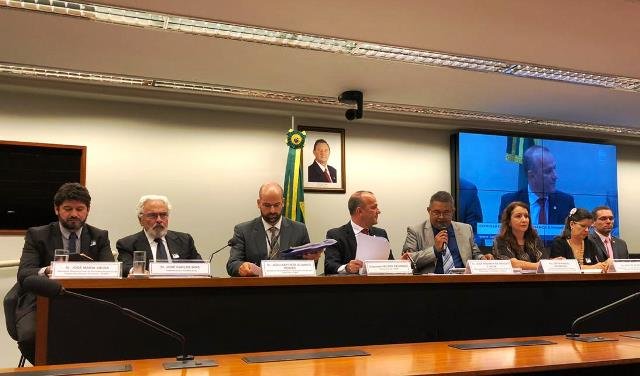The Arns Commission monitors allegations of torture in prisons
6 Dec 2019, 17:37
On December 4, the president of the Arns Commission, José Carlos Dias, participated in a public hearing convened by the Commission on Human Rights and Minorities of the House of Representatives, in Brasilia, to discuss the denouncements of torture involving the Penitentiary Intervention Task Force (Força-Tarefa de Intervenção Penitenciária – FTIP, in Portuguese) in several Brazilian states, especially in Ceará and Pará.
The hearing was chaired by Deputy Helder Solomon (Workers’ Party – State of Espírito Santo/PT-ES), president of this parliamentary commission. Some of the founders of the Arns Commission, as well as members of the National Mechanism for the Prevention and Combat of Torture, the Federal Public Prosecutor’s Office, the Brazilian Bar Associate of the State of Pará, the Ceará State Council for Human Rights, the Ombudsman's Office of the National Penitentiary Department (Departamento Penitenciário Nacional – Depen), the Prison Pastoral (part of the National Conference of Bishops of Brazil – CNBB), and representatives from civil society, were present.
José Carlos Dias spoke about the serious abuses and torture practices in the prison units under the Penitentiary Intervention Task Force, expressed his indignation, and asked for urgency in the investigations on the complaints contained in the report of the Mechanism, “so that all those who are directly and indirectly involved in these crimes can be held accountable”. He stressed that “it is outrageous to accept that in Brazil things like this still happen: prisoners piled up in cells, drinking water from the toilet, infected with various diseases, suffering all sorts of torture”.
The Penitentiary Intervention Task Force (FTIP) was defended by the ombudswoman of the National Penitentiary Department, Cintia Rangel Assunção, and by the deputy and chief police officer, Éder Mauro (Social Democratic Party – State of Pará/PSD-PA), who supported the view that “prisons cannot be hotels for criminals”. Deputy Erika Kokay (Workers’ Party – Federal District/PT-DF), a member of the commission, insisted on the continuity of the investigations. Representatives of civil society called for the extinction of the FTIP.
Although he was not part of the panel, former minister Paulo Vannuchi, a member of the Arns Commission, was greeted throughout the hearing. Vannuchi is cited for contributions in this field on the Mechanism's report itself.
Representatives from the Human Rights Commission of the Chamber of Deputies will go to Pará for visits and hearings in prison units, as well as a meeting with Governor Helder Barbalho. The Arns Commission will continue to follow this case.